It’s a proven fact: diverse companies are more profitable, innovative, and generally perform better. Ethnically diverse companies and gender diverse companies are 36% and 25% more likely, respectively, to financially outperform organizations that are of average diversity in their industry.
This is hardly surprising when you consider that diverse people naturally bring new perspectives and ideas to the table, particularly when it comes to problem-solving. So, if you’re looking to boost productivity within your team, you need to get proactive about diversity.
We’re happy to report that the vast majority of hospitality businesses already understand the importance of hiring a diverse workforce. However, a wide gap remains between how hospitality enterprises view their policies and how workers experience them. According to a 2022 survey conducted by the National Restaurant Association, only 30% of current employees (and 14% of former employees) believe the diversity programs at their restaurants have a positive impact on the workplace.
With that in mind, we’ve put together this guide to help your hospitality business. Read on for how to improve candidate pool and workforce diversity.
What’s in?
Like what you see?
Don’t miss out. Subscribe to our quarterly digest to get the latest TA and TM resources delivered right to your inbox.
What does workplace diversity really mean?
People tend to think of “workplace diversity” just in terms of race and gender, but in reality, it encompasses so much more than that. If you want to create a truly diverse workplace, here are a few other aspects to consider:
- Religion
- Culture
- Socio-economic status
- Work experience and previous career paths
- Gender identity
- Physical abilities
- Sexual orientation
- Age
- Education
We’ve detailed the dimensions of diversity in this article: Diversity and Inclusion Metrics: What and How to Measure.
Here’s what’s included in these categories, in big lines:
- Primary dimensions of diversity include basic characteristics like age (generational diversity), race, gender, and sexual orientation;
- Secondary dimensions include education, marital and parental status, and religious beliefs;
- Workplace dimensions include the individual’s job level, work shift, and years with the organization;
- Style dimensions include work habits, leadership style, and communication style.
So, as you can see, diversity is intersectional and an ever-evolving topic. So it’s crucial to keep your finger on the pulse by regularly engaging with your target market at your company.
“Listen to your target market. It’s okay to not have all the answers, but it’s so important to have the awareness and empathy to ask, learn, and appreciate others’ lived experience. Once you have these inputs, make change!”
Allison Corry, International Talent Marketplace Director, Kraft Heinz
How does recruiting for diversity benefit hospitality businesses?
In addition to some of the benefits we’ve already mentioned, you’ll also be able to take advantage of the following perks:
A larger talent pool
If you’re hiring from the same tiny demographic talent pool, you’ll assemble a team who all think alike. So, if you want to stay ahead in the increasingly competitive hospitality industry, stagnation just isn’t an option.
When you get proactive about diversity recruiting for your hospitality business, you will be able to discover previously untapped talent sources.
And how does this help you?
By having people with a variety of backgrounds and cultural insights in your talent pool, you’re more likely to create an organization that confidently comes up with innovative twists on previously established ideas – or better yet, can think of something completely fresh.
When operating alongside people with different backgrounds and working styles, we’re forced to recognize varying points of view. This works wonders for encouraging staff to think creatively, leading to better decision making.
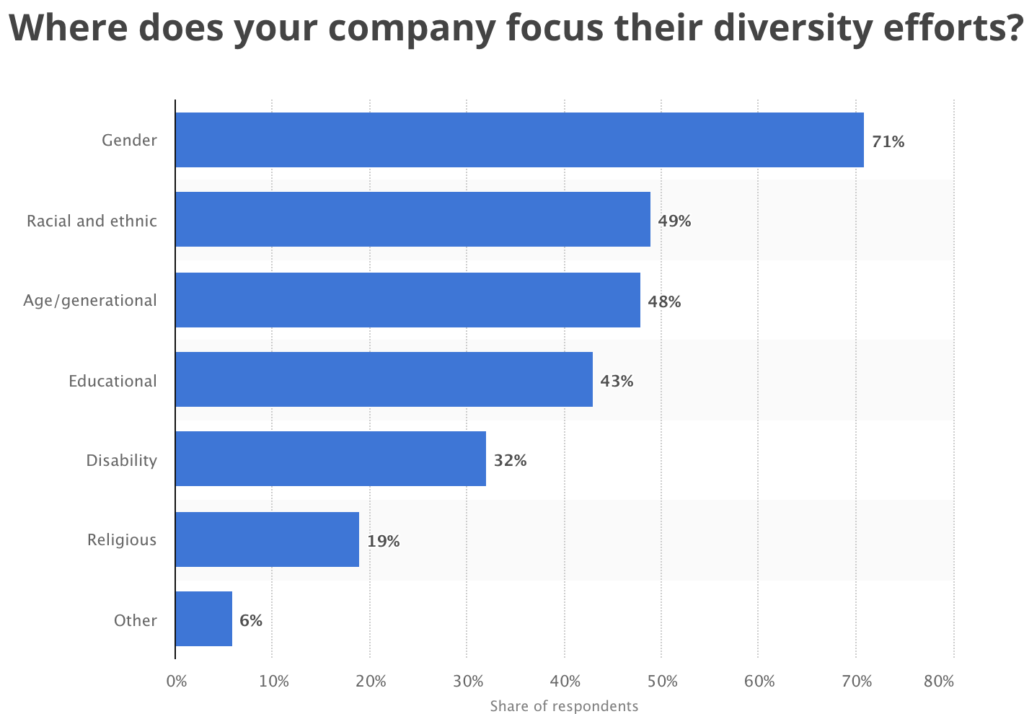
Only 6% of companies focus on other types of diversity than the most well-known categories. You should take different forms of diversity into consideration when hiring for your hospitality business.
Attracting and retaining top talent as a competitive advantage
According to a 2023 Global Parity Alliance study, in partnership with McKinsey & Company, job seekers are more likely to look for a DEI policy that aligns with their expectations. In fact, 39% of global job seekers have turned down or decided not to pursue a job opportunity because of a perceived lack of inclusion.
Promoting your DEI strategy can increase your talent pool and attract top talent to your organization. This trend is amplified among Gen Z, for whom a “diverse and inclusive organization” is one of the top three things they look for in an employer.
Brands that exude meritocracy inspire positive morale, and you’ll already know that happy employees pay dividends. When you create a workplace culture staff enjoy, they’ll be more engaged in their work, which helps to keep your entire team motivated to produce their best possible output. You’ll find that over time this will build a sense of momentum; as such, you can quickly see how diversity plays a massive part in boosting your bottom line!
A better representation of your customer base
If you work in the hospitality industry, there’s a good chance your business will attract customers from a variety of countries and cultures – so it pays to know the rules.
If you want to engage with your customers effectively, your staff should reflect the entirety of your market. Without diversity, you won’t achieve that.
If you’re a hotel or restaurant owner, a diverse workforce increases the likelihood of having a member of staff that better understands the needs of your specific clients. So, in theory, you should be able to tailor your customer experience to ensure everyone who walks through the door feels as welcome as they possibly could be, which is a surefire way of boosting brand loyalty amidst your clientele.
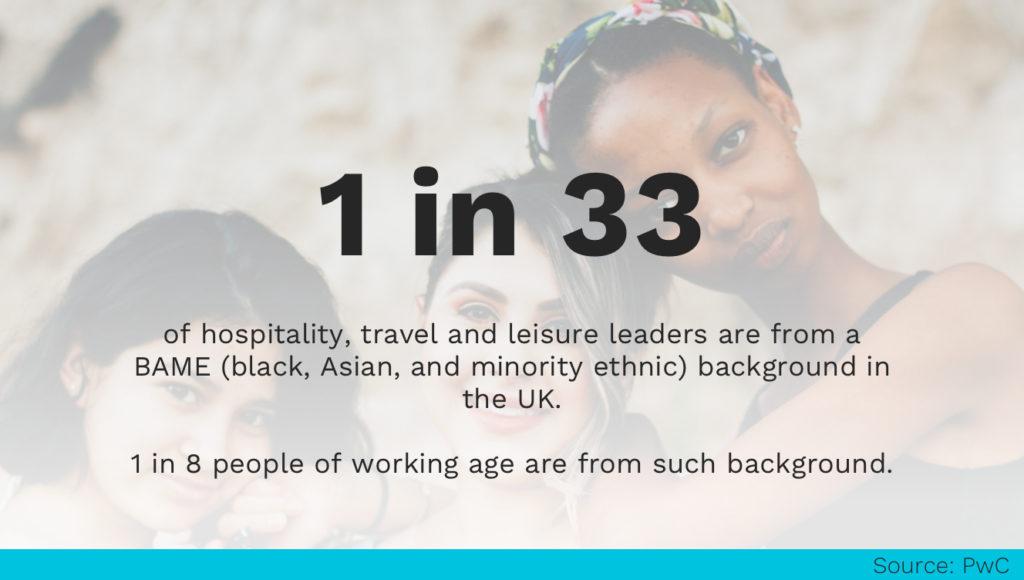
Employees from a BAME background are largely underrepresented in the hospitality business leadership in the UK. Moreover, 40% of companies report not having the data to calculate their ethnicity pay gap. Creating an ethnicity pay gap report is one of the ways to raise awareness about the existing pay gap.
How to improve recruiting for diversity in the hospitality industry?
If you’re unsure where to begin with boosting diversity in your hospitality business, here are a few ideas:
1. Expand your ideal candidate profile
Although it’s a good idea to have a rough list of skills and characteristics you’re looking for in a potential candidate, it’s also important to be flexible when creating your ideal candidate profile. Try and challenge yourself to value transferable skills and be open to various experiences and backgrounds.
For example, someone with a background in retail could have a lot to offer the hospitality industry. After all, they’ll have spent a good deal of time nurturing their customer service, problem-solving, and time management skills, all of which are imperative qualities to have when working in a restaurant or hotel.
Top tip: Phrase your job ads in such a way that you encourage people with all manner of experiences and backgrounds to apply for your vacancy.
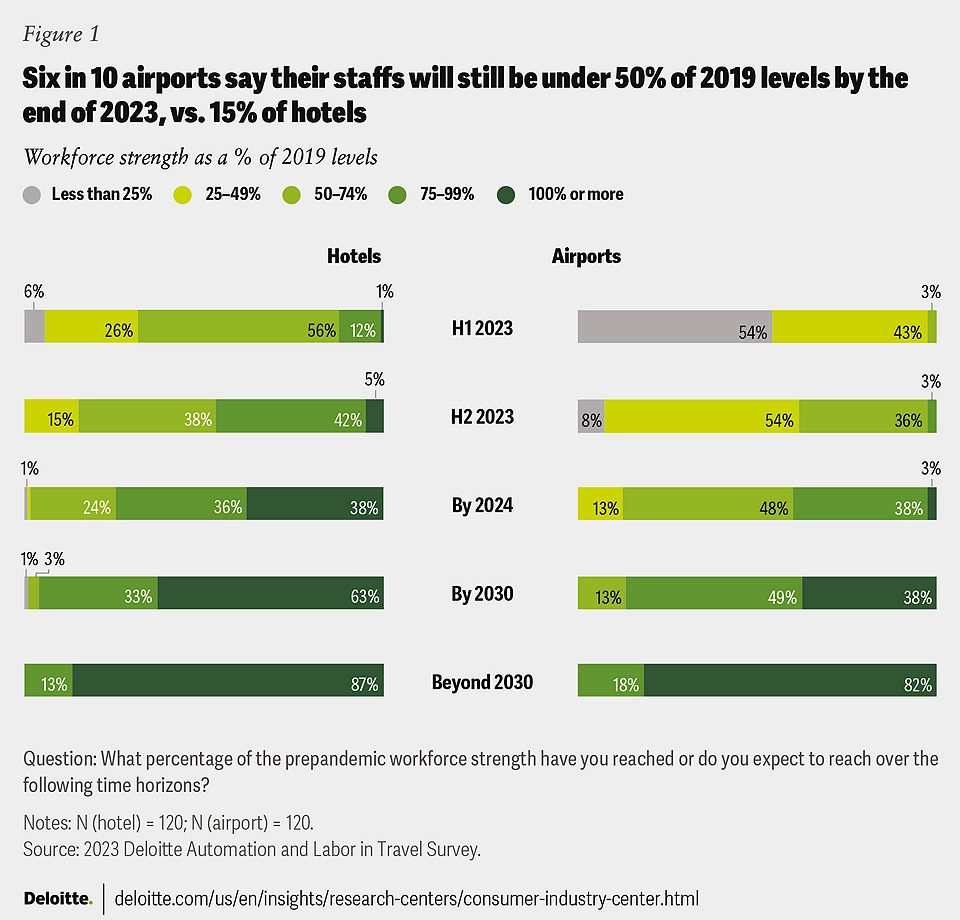
Source: Deloitte. There continues to be a labor shortage in the hospitality industry. If you want to succeed in hiring new employees, you need to screen candidates in, not out.
2. Broaden your search for candidates
If you’re not using programmatic job advertising, you should consider doing so. This comes in really handy for extending your reach by advertising on platforms you may have never heard of or otherwise considered. It helps you get your hospitality vacancies in front of a variety of qualified candidates.
The beauty of programmatic job advertising is that the majority of the process is automated. This makes it ideal for recruiters with limited time. After all, the main reason companies shy away from diversity is because they’re ‘too busy.’ As many as 41% of companies claim they don’t have the time to implement diversity initiatives! So, nip this excuse in the bud by signing up with a programmatic job ad solution.
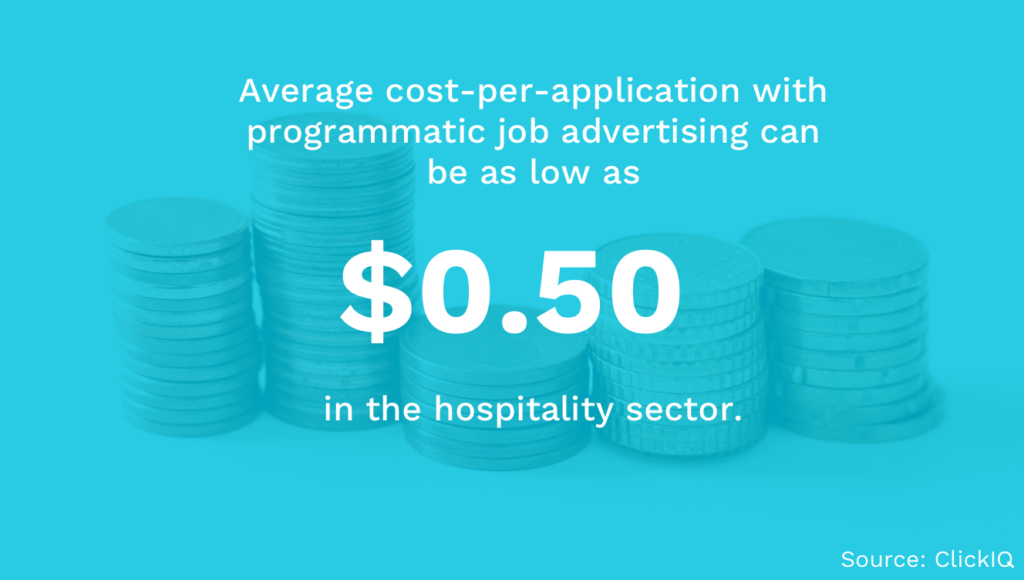
Moreover, if you have a strong employer brand and potential candidates recognize you, your conversion rate increases and the costs further decrease.
3. Create a hiring process that engages prospects
If you have any multicultural and diversity credentials you can brag about, do. This is bound to keep prospects interested. If you’ve spent years building a robust set of diversity-friendly policies, then shout them from the rooftops!
Also, be sure to showcase how diverse your organization is in company videos featured in your application process. You’ll be amazed at how many talented minority candidates you’ll attract when you prove a glowing track record for valuing diversity.
Moreover, you can easily hold the interest of your hospitality applicants by just being clear about deadlines and communicating effectively with candidates. People hate second-guessing what decision-makers are thinking, so make it a priority to keep them in the know.
Fairness in Hiring & Talent Management Drives Better Business Outcomes
Fair talent decisions help both hospitality businesses and job seekers. Read this insightful whitepaper to learn how hiring and process fairness drive innovation, reduce hiring costs, and support a diverse workforce.
4. Train your interviewers
Train managers (and anyone else selecting candidates) in the art of conducting an effective interview.
Draw to their attention the dangers of inadvertent biases and encourage them to question their decisions. Interviewer training should define your diversity standards and expectations well before employees start interviewing anyone.
Be sure to set benchmarks on how interviewers evaluate a candidates’ competency and fit prior to the interview. When interviewing hospitality candidates, teach the interviewers to look for service-relevant characteristics like customer orientation, stress management, and multitasking, explain to them how to assess these traits in their candidates rather than focus on their intuition or ‘gut feeling’.
Encourage interviewers to ask themselves the following question when they’re recruiting: ‘Would [you] be making the same decision if the person’s cultural background were the opposite of what it is?’ This exercise goes a long way in helping check any prejudices we might unknowingly have.
Top tip: Recruitment experts also encourage companies to go one step further to tackle unconscious biases. They suggest phone screening before an in-person interview that focuses purely on their skills and knowledge.
Why?
Well, phone screening provides a relatively ‘blind interview,’ which automatically eliminates visually-based unconscious biases. Some recruiters even go as far as to use voice modulation apps so that the interviewer can’t guess the candidate’s gender.
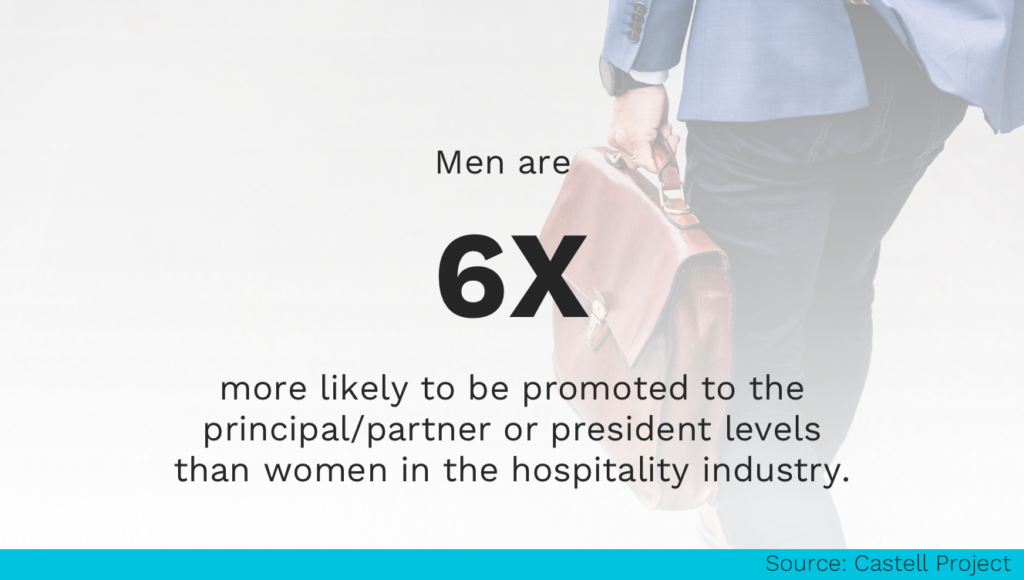
It’s important to watch out for bias not only when recruiting new employees but also when promoting internally.
5. Introduce diversity training
It’s worth noting that diversity training goes well beyond preparing a manager to conduct fruitful interviews.
Like we’ve already alluded to, diversity is more than just race and gender. So, managers need to know how to handle a truly diverse workforce. This is the only way to ensure your restaurant or hotel provides an inclusive place for everyone to work.
So, if you haven’t already, commit to creating a diversity-training program. Each employee should have to take this as part of their onboarding process.
If you want to go one step further (which we suggest doing), host annual refresher training for your current staff members. That way, everyone should be on the same page. If you need help with getting the training right, invite a cultural diversity expert to help you train your employees and consider additional training for supervisory roles; specifically, on handling conflict resolution in diverse environments.
Knowledge is power. So, by equipping your staff with the know-how, you’ll encourage an attitude of respect and tolerance. Work alongside your more seasoned employees and get them to mentor younger workers. This technique helps guarantee that your company’s stance on diversity is upheld throughout the entirety of your team.
Last but not least, remember to revise your policies regularly, so they reflect the content of your diversity training. This will force you, your managers, and employees to put what you’ve learned into practice.
6. Make diversity part of your organization’s vision
By this, we mean taking a strong stance on diversity by showing the world that it’s a vital part of your hospitality business.
If you’re unsure how, there are a few things you can do:
Reflect your respect for diversity in your employer brand. You need to make it known to your current and future employees your position on this vital matter. Check out how large hospitality brands such as SODEXO, Hyatt or Four Seasons are doing it.
On the Careers page on your website, include diversity-related content. This could include things like a mission statement, images, and any awards that pertain to your positive stance on diversity.
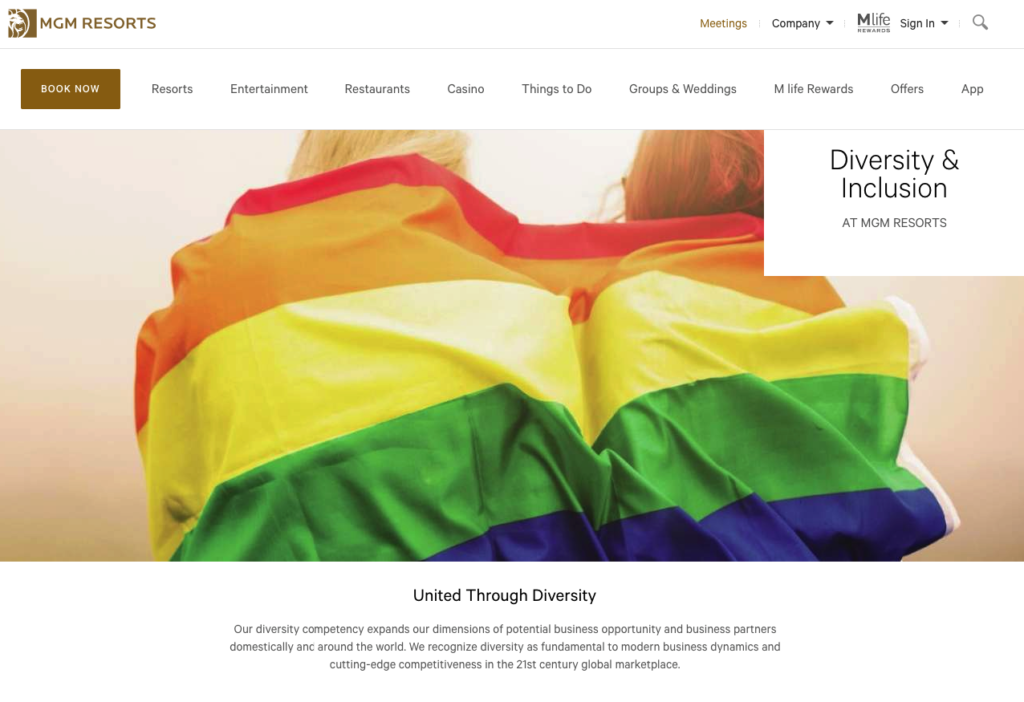
MGM Resorts have a dedicated Diversity & Inclusion section on their website, where they mention various diversity initiatives including supplier diversity. They also include such chapter in their annual corporate social responsibility report.
Are you making an effort to be proactive about diversity? If so, use social media to spread the word. Share pictures, blog posts, and reviews about the initiatives your company is taking.
If you have any print materials such as a prospectus, catalog, or flyers, ensure they also reflect that you’re a diversified brand.
Please note: If you don’t feel your company is doing everything they can to promote diversity, you’ll struggle to put this advice into action. If you fall into this category, focus your efforts on creating a more diverse workforce before you do anything else. Otherwise, you risk coming across as hollow and superficial, which isn’t just ethically questionable, but it could also damage your brand’s reputation.
“Be authentic! Candidates will see through employers that do not genuinely live by their values.”
Vicky Rowland, Early Careers Talent Lead, Sage UK Limited
7. Make diversity a team effort
You don’t have to keep coming with fresh initiatives and ideas yourself. Instead, seek feedback from senior members of staff. Not only will this help you stay on top of things, but it also prompts your entire management team to stay on board with your plans. In short, take the pressure off by making diversity a team effort.
You could also try forming a committee. This could just be a small group of employees (brimming with diversity themselves – different employee ranks, races, genders, etc.) who you’ve assigned the task of creating a more diverse workplace.
As we’ve just said, when you ask employees to lead the way, the principles of tolerance and acceptance should (in theory) permeate deeper into the framework of your business.
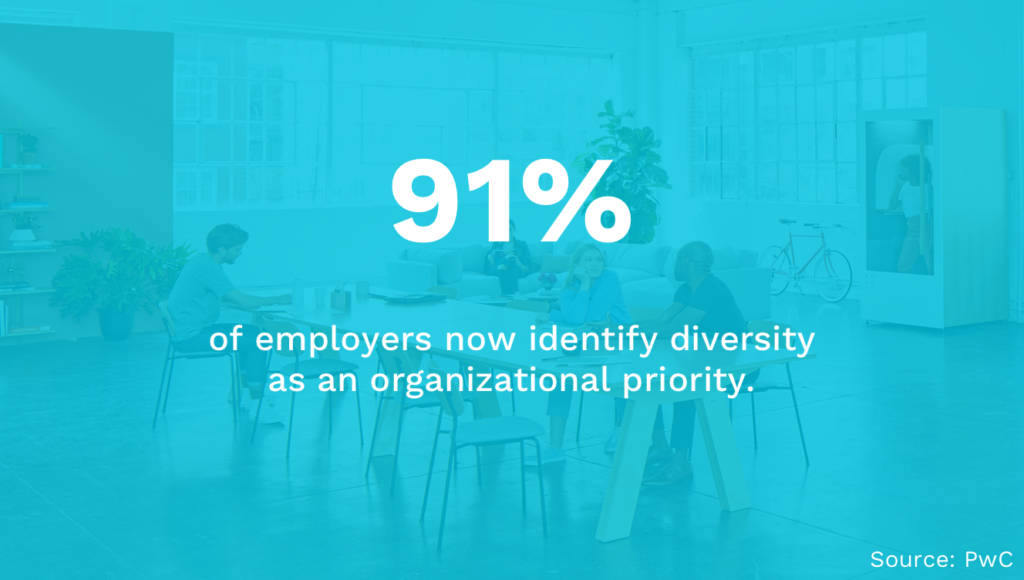
That’s a great first step to build a truly diverse and inclusive workplace.
Ready to make a change?
Injecting diversity into your recruitment strategy isn’t always easy in the hospitality industry. However, it’ll undoubtedly be worth persevering with. The advantages you gain merit the extra effort you make.
All of the tips mentioned above will help steer you in the right direction. So, what are you waiting for? Enable fair and predictive hospitality hiring and reap the rewards!



